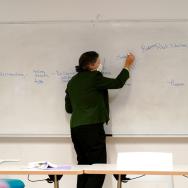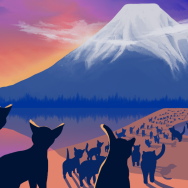In the age of COVID-19, communication between leading researchers and the general population has never been more important. However, sharing epidemiological information clearly and succinctly is no easy task—which is why a science communications course series offered by the University of Chicago College tackles this problem.
The goal of the courses is to teach students crucial communication techniques unique to scientific fields, thereby preparing them to convey complex research and information to the public without forfeiting scientific accuracy.
Co-taught by Prof. Peggy Mason and Sara Serritella—a UChicago lecturer and director of communications at the University’s Institute of Translational Medicine—the Science Communication courses cover written, visual and hands-on methods of sharing data with the general public.
"It allows everything students have learned in their UChicago career to live outside the lab and change the world," Serritella said. "Science can impact and change people's lives. You have to understand how things work with very concrete details in order to accurately say what it is and why it matters so that the public can use it."
Against the backdrop of a pandemic, the sequence has been extraordinarily useful to those interested in science communications.
“Communicating science to non-scientists, non-academics, is a goal that should go hand in hand with learning science,” said Mason, who is appointed in the Department of Neurobiology. “We're giving students a very good opportunity for them to show us, themselves and the world what they have learned.”
Fourth-year student Kelli Hu, who studies biological sciences, used the skills she learned to create both a web presence for a University of Chicago medical research team and a behind-the-scenes video highlighting surgical protocols.
“Everybody at UChicago needs to take this sequence,” Hu said, who took the writing and video courses. “It’s not normally a class I would have signed up for, because my personality is quiet and not as outgoing, but it really got me out of my comfort zone, and I feel like that’s where the true growth really happens.”
Another student, Swathi Balaji, AB’20, used her time in the sequence to produce a video on UChicago Medicine’s diabetes registry, and she went on to earn a highly coveted spot at the University of Southern California’s Keck School of Medicine.
Be it a published article or a professional video, each student completes the courses with tangible experience and polished final products that they can carry with them for the rest of their career.
“From training how to interview someone to learning to avoid medical misinformation, there’s so much we learned in such a short amount of time,” said Ingie Sorour, a fourth-year who took the digital “SciComm” writing course. “These courses helped me grow with confidence and a love for spreading science the right way. This was by far my favorite class here at UChicago.”
There are currently two courses in the sequence: “Writing a Digital Science Story,” which is offered during the fall and “Producing a Science Video Story” offered in the spring. Next year, Serritella and Mason expect to add a course on “Building a Science Exhibit.”
Writing a Digital Science Story
In “Writing a Digital Science Story,” students synthesize primary research data into a variety of written reports, including blogs, articles and social media posts. By the end of the quarter, students have completed two polished written pieces that communicate science to a lay audience.
One of these pieces is included in the National Institute of Health's The New Normal Campaign through the Institute for Translational Medicine to increase awareness of and access to health research by matching volunteers with specific studies.
“The style of writing was unlike anything I'd done before,” said fourth-year student Kaela Jolibois, who studies neuroscience and took the class last fall. “It was a challenging assignment, but it felt fulfilling to have my writing contribute to something with a greater scientific purpose."
The second piece is done in collaboration with the Illinois Science Council, giving undergraduate students the opportunity to walk away with a published article on a scientific topic of their choosing.
Revisions and constructive peer criticism are central to the class’s design. A class size capped at 10 encourages interactivity, Mason and Serritella said, as well as more personalized feedback on projects from peers and instructors.
Producing a Science Video Story
The second course in the series, “Producing a Science Video Story,” improves students’ oral and video communication skills.
“This is by far one of the best courses I took at UChicago,” said Simatul Rashid, who took the the video course last year. “So much of research is just relegated to the scientific world, that it just gets stuck in there and it doesn't go to the people who need it. That's why it's so important for science communications to break everything down.”
Mason and Serritella teach students how to write engaging scripts and deliver a compelling story. Students end the quarter with a professionally produced video on the scientific topic of their choosing. Videos include visual aids and high-quality animations in partnership with UChicago Creative.
"Projects like these help students apply the core concepts they've learned into a real-world communications setting," Serritella said. “Just like there’s hands-on lab work in science and medicine, we give students an environment to roll up their sleeves and learn from doing.”
“Producing a Science Video Story” and “Writing a Digital Science Story” require three prior quarters of a bioscience fundamentals sequence. Each course meets the requirements for the major.
“Our students have unbelievable success getting jobs and getting internships because of their communication skills, starting even with writing better cover letters,” Mason said. “They’re able to really capitalize on their scientific knowledge because they’ve gained in more powerful skills in communication from our courses.”
Building a Science Exhibit
The final course in the series, “Building a Science Exhibit,” will involve students working together as a class to create an interactive exhibit that shares some facet of scientific research with the public. Field trips to local museums will allow students to learn about and appreciate different methods of data visualization and interaction. The quarter will end with an in-depth review of the final exhibit by an advisory board of researchers from museums across Chicagoland.
“Building a Science Exhibit” will be offered in during the 2022-2023 academic year and is open to any third- or fourth-year student.
"Students can use what they've learned and created in these classes to propel their career and increase the reputation of the University of Chicago as a renowned research institution," Serritella said. “You need to know how to communicate your science effectively, which is a skill that stays with students as they go into medical school and graduate school.”
Whether it's through working with a nationwide health campaign, directing a video, or collaborating on an exhibit, the Science Communications course series prepares its students for their future careers in far more ways than one.
"I am walking away from this class with improved writing skills, an expanded mindset towards communications, a headshot, and polished social media profiles for me to connect with other professionals," Jolibois said. "It was so fulfilling to revisit my earlier drafts and see how much I had improved."
Science communications skills are not only fulfilling and important for students like Jolibois, but being able to connect with society is critical for the research community at large, Mason said.
“In the end, many scientists work for the public,” Mason said. “They are our employers through their tax dollars. To maintain that belief in science as working for the greater good, we absolutely need to come out of the ivory tower and explain in understandable terms what we are doing and why the taxpayers should want us to keep going.”
—This story was first published on the College website. Learn more about Science Communication here, and visit their YouTube page to watch videos produced by students as part of their coursework.

